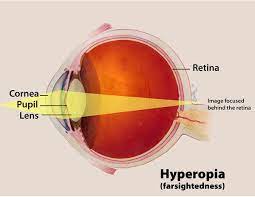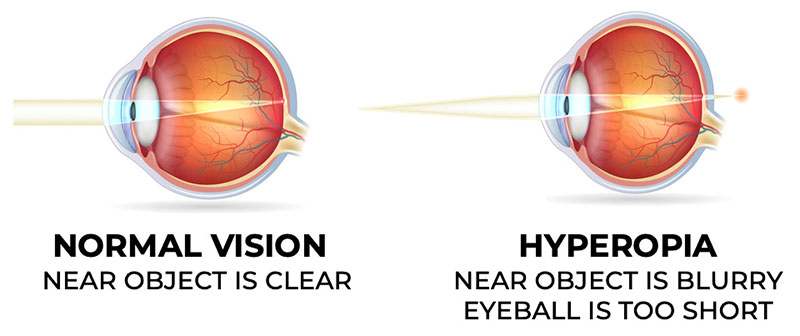Hyperopia, also known as farsightedness, is a condition that affects how well you can see objects that are close to you. This occurs when the eyeball is too short or the cornea curves too much, causing light to focus just beyond the retina instead of directly on it. If you are suffering from hyperopia, you may have trouble reading or doing close-up work. In this blog post, we will discuss the causes and symptoms of hyperopia, as well as treatment options.
Contents
What Is Hyperopia-farsightedness?

Hyperopia, or farsightedness, is a common vision problem that affects about 30 percent of the population. It occurs when the eye does not focus light properly on the retina, resulting in blurred vision. People with hyperopia often have trouble seeing objects up close, but can see distant objects clearly.
There are two types of hyperopia: simple and compound. Simple hyperopia occurs when the eyeball is too short or the cornea (the clear, outer layer of the eye) is too flat. Compound hyperopia occurs when both the eyeball and cornea are imperfections.
Hyperopia can be mild, moderate, or severe, depending on how far off the eye is from being perfectly round or how flat the cornea is. People with mild hyperopia can usually see clearly without corrective lenses. However, people with moderate or severe hyperopia may need glasses, contact lenses, or refractive surgery to correct their vision.
What Are The Causes Of Hyperopia-Farsightedness?
The causes of hyperopia-farsightedness are as follows:
- A cornea that is too flat.
- An eyeball that is too short.
What Are The Symptoms Of Hyperopia-farsightedness?
The symptoms of hyperopia may include the following:
- Blurry vision when looking at objects up close
- Eye fatigue
- Headaches
- Squinting
Complications
There are various complications:
Amblyopia
Also known as “lazy eye”, amblyopia occurs when the brain starts to favor one eye over the other because one eye is not being used properly. This often happens in children who have a large refractive error.
Strabismus
This is a condition in which the eyes are not properly aligned with each other. It can occur in children with a large refractive error.
Glaucoma
This is a condition in which the pressure inside the eye becomes too high. It can be associated with farsightedness.
Cataracts
This is a condition in which the lens of the eye becomes cloudy. It can be associated with farsightedness. We also provide effective cataract surgery (Free Cataract surgery by EyeMantra Foundation for needy people).
Macular degeneration
This is a condition in which the center of the retina (the macula) deteriorates. It can be associated with farsightedness.
If you have any of these complications, you should see an ophthalmologist (eye doctor) for treatment.
Treatment

The treatment for hyperopia depends on the severity of the condition. If you have a mild form of hyperopia, you may not need any treatment. Your eyes may be able to compensate for the slight amount of farsightedness.
The treatment options for hyperopia-farsightedness are as follows:
Eyeglasses
Wearing eyeglasses or contact lenses can correct blurry vision caused by hyperopia.
Contact lenses
Hard contact lenses are not a good choice for people with hyperopia, because they can’t correct the problem enough. Soft contact lenses can correct hyperopia, but they may cause some side effects, such as headaches and eye fatigue.
Vision Correction surgery
This type of surgery is done to change the shape of your eye so that light is focused correctly on the retina. For example, in laser-assisted in situ keratomileuses (LASIK), a laser is used to remove some corneal tissue to make the cornea thinner and change its shape.
Corneal implants
A type of surgery called phakic intraocular lens implantation may be an option if you have a severe form of hyperopia and don’t want to have LASIK surgery. In this type of surgery, an artificial lens is implanted in the eye to help focus light.
The best treatment for you will depend on the severity of your condition and your lifestyle.
If you have mild hyperopia, you may not need treatment. Your eyes may adjust over time and correct the problem on their own. If you have moderate or severe hyperopia, you’ll likely need to wear corrective lenses or have surgery to correct your vision.
Hyperopia can also be treated with a method called “orthokeratology” or “corneal refractive therapy.”
Those who suffer from farsightedness will have a positive number as their prescription, such as +3.00. The higher the number is, the stronger your lenses need to be.
Conclusion
It may be concluded that hyperopia-farsightedness is a condition in which distant objects appear clearer than those that are close. This is because the eye has difficulty focusing on near objects. Hyperopia often occurs when the eyeball is too short or when the cornea has too little curvature. People with hyperopia may experience headaches, eyestrain, and fatigue. Treatment options for hyperopia include eyeglasses, contact lenses, and refractive surgery.
For more information, please contact Eye Mantra. We would be happy to schedule a consultation for you. EyeMantra offers the most advanced eye surgery options including PRK, Femto Lasik, SMILE surgery, Standard lasik, and Contoura vision. We provide effective cataract surgery in Delhi. If you have any questions on lasik surgery, lasik surgery cost and lasik procedure, call us at +91-9711116605 or email at [email protected].


